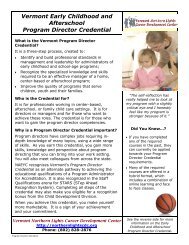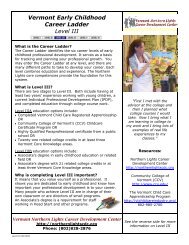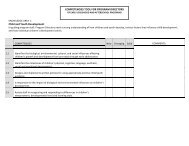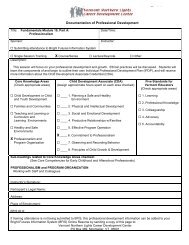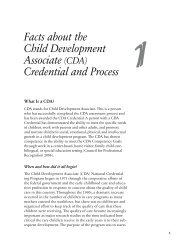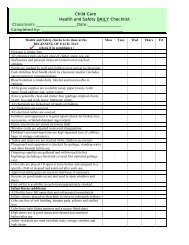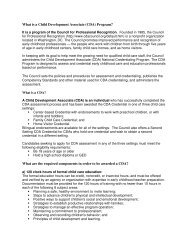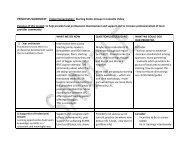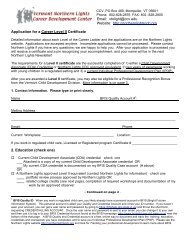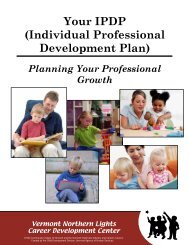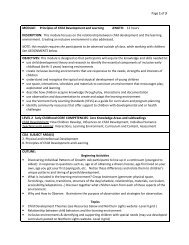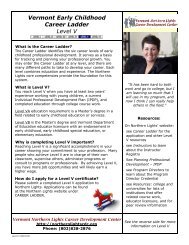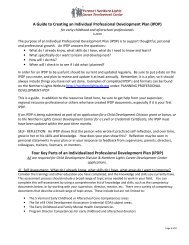Fundamentals Modules - Vermont Northern Lights Career ...
Fundamentals Modules - Vermont Northern Lights Career ...
Fundamentals Modules - Vermont Northern Lights Career ...
You also want an ePaper? Increase the reach of your titles
YUMPU automatically turns print PDFs into web optimized ePapers that Google loves.
<strong>Fundamentals</strong> Course 04-10 Page 1 of 6<br />
Fundamental <strong>Modules</strong><br />
1<br />
Explanation of the CDA subject area codes and the five <strong>Northern</strong> <strong>Lights</strong> Core Knowledge Areas are on<br />
page 5-6 of this document (Reading the codes for the workshop sessions)<br />
2<br />
In addition to the assignments listed, there are two required assignments that are due at the discretion of<br />
the instructor: a project or presentation, and the observation of the practitioner. A complete list of<br />
assignments is in 1B: Required student assignments for the <strong>Fundamentals</strong> Course<br />
Module<br />
(see also course objectives)<br />
Module 1<br />
Introduction to <strong>Fundamentals</strong><br />
for Early Childhood<br />
Professionals<br />
Health, Safety and Nutrition<br />
Objectives 1, 3 & 4<br />
CDA & Core Competencies Assignment Due 2<br />
Covered 1<br />
CDA subject area 1: Planning a safe,<br />
healthy, learning environment<br />
<strong>Northern</strong> <strong>Lights</strong> Core Knowledge areas<br />
Healthy and Safe: A. Healthy<br />
environments and Health Needs, B.<br />
Safe Environments, C. Nutrition, D.<br />
Physical Activity<br />
Child development: A. How children<br />
develop<br />
Reflection/writing<br />
This class session will introduce the course requirements and forms. It will also introduce<br />
developmental milestones, Developmentally Appropriate Practice and important health and safety<br />
procedures in working with young children in group settings. Students will learn common causes of<br />
injuries and illness, be introduced to nutrition as it relates to child development and how to<br />
communicate this effectively with families.<br />
Module 2:<br />
The Early Childhood Learning<br />
Environment<br />
Objectives 3 & 4<br />
CDA subject area 1 Planning a safe,<br />
healthy, learning environment<br />
<strong>Northern</strong> <strong>Lights</strong> Core Knowledge areas<br />
Teaching and Learning: A. Interactions,<br />
B. Learning Environment<br />
Child Development: C. Individual<br />
Differences<br />
Reflection/writing<br />
This session will focus on creating inclusive and welcoming environments for all children and families.<br />
Room arrangement, selecting materials, learning centers, safety considerations as well as evaluation<br />
and assessment of the environment will be addressed. Outdoor play areas will also be discussed.<br />
Module 3: Part A<br />
Child Development:<br />
Emotional development<br />
Introduction to Observation<br />
and Recording Behavior<br />
Objectives 2 & 6<br />
CDA subject area 3,7 & 8<br />
Positive Ways to Support children’s social<br />
and emotional development; Observing<br />
and recording children’s behavior,<br />
Principles of child development and<br />
learning<br />
<strong>Northern</strong> <strong>Lights</strong> Core Knowledge areas<br />
Child Development: A. How Children<br />
Develop. B. Influences on Child<br />
Development<br />
Teaching and Learning: A. Interactions,<br />
D. Assessment<br />
Reflection/writing<br />
This session will discuss milestones in the emotional development of young children. Activities will<br />
include how and when children develop self-control and appropriate responses to typical<br />
developmental stages. The role of observing and recording children’s behavior is introduced.
<strong>Fundamentals</strong> Course 04-10 Page 2 of 6<br />
Module 3: Part B<br />
Child Development:<br />
Emotional Development<br />
(continued) and the<br />
Influence of Culture<br />
Objectives 1& 5<br />
CDA subject area 3,7 & 8<br />
Positive ways to support children’s social<br />
and emotional development; Observing<br />
and recording children’s behavior,<br />
Principles of child development and<br />
learning<br />
<strong>Northern</strong> <strong>Lights</strong> Core Knowledge<br />
Areas<br />
Child Development: A. How Children<br />
Develop, B. Influences on Child<br />
Development<br />
Teaching and Learning: A. Interactions,<br />
D. Assessment<br />
Reflection/writing<br />
1st written observation<br />
of a child<br />
This session will continue to look at the emotional development of young children. Activities will focus<br />
on how culture and other characteristics influence emotional development. Additional methods for<br />
observing and recording children’s behavior will also be addressed.<br />
Module 4:<br />
Child Development:<br />
Cognition and Intellectual<br />
Development<br />
Objective 1<br />
CDA subject area 2 Steps to advance<br />
children’s physical and intellectual<br />
development<br />
<strong>Northern</strong> <strong>Lights</strong> Core Knowledge Area<br />
Child Development: A. How Children<br />
develop<br />
Reflection/writing<br />
2nd written<br />
observation of a child<br />
This session will focus on cognitive development. Activities and discussion focus on developmental<br />
milestones and brain development. Strategies that children use to organize information, learn new<br />
concepts and develop the variety of skills we associate with intelligence will be covered.<br />
Module 5:<br />
Child Development:<br />
Language and Literacy<br />
Objective 1 & 3<br />
CDA subject area 2 Steps to advance<br />
children’s physical and intellectual<br />
development<br />
<strong>Northern</strong> <strong>Lights</strong> Core Knowledge<br />
Areas<br />
Child Development: A. How children<br />
develop<br />
Teaching and Learning: A. Interactions,<br />
C. Curriculum and Content<br />
Reflection/writing<br />
First reaction paper<br />
(Practice Competency<br />
statement)<br />
This session will identify milestones related to typical language and literacy development. It will also<br />
discuss how language and communication are related. Students will learn strategies for encouraging<br />
communication with children and how literacy supports communication.<br />
Module 6:<br />
Communication:<br />
Building Relationships<br />
CDA subject area 4, 6 Strategies to<br />
establish productive relationships with<br />
families; Maintaining a commitment to<br />
professionalism<br />
Reflection/writing<br />
Objective 2<br />
<strong>Northern</strong> <strong>Lights</strong> Core Knowledge<br />
Areas<br />
Families and Communities: B.<br />
Communication<br />
Program Organization and<br />
Management: A. Professionalism, B.<br />
Working with Staff and Colleagues
<strong>Fundamentals</strong> Course 04-10 Page 3 of 6<br />
This session addresses the skills needed to effectively communicate with adults. Strategies for<br />
creating an environment that promotes and encourages respectful communication with colleagues and<br />
families will be discussed. Students will also learn how to approach families and how to discuss<br />
difficult topics.<br />
Module 7: Part A<br />
Child Development:<br />
Social Skills and a Sense of<br />
Oneself<br />
Objectives 6 & 1<br />
CDA subject area 3:<br />
Positive ways to support children’s social<br />
and emotional development<br />
<strong>Northern</strong> <strong>Lights</strong> Core Knowledge<br />
Areas<br />
Child Development: A. How Children<br />
Develop, B. Influences on Child<br />
Development, Individual Difference<br />
Teaching and Learning: A. Interactions,<br />
C. Curriculum and Content, D.<br />
Assessment<br />
Families and Communities: A.<br />
Relationships<br />
Reflection/writing<br />
second reaction paper<br />
(practice Competency<br />
statement)<br />
This session will explore how children form a sense of themselves. The concepts of attachment and<br />
resiliency will be addressed. The class will address positive guidance, coping with transitions and<br />
other strategies that support children’s social development and developing sense of self.<br />
Module 7: Part B<br />
Child Development:<br />
Social Skills and<br />
Understanding Others<br />
Objectives 6 & 3<br />
CDA subject area 3:<br />
Positive ways to support children’s social<br />
and emotional development<br />
<strong>Northern</strong> <strong>Lights</strong> Core Knowledge<br />
Areas<br />
Child Development: A. How Children<br />
Develop, B. Influences on Child<br />
Development, C. Individual Variance<br />
Teaching and Learning: A. Interactions,<br />
C. Curriculum and Content<br />
Families and Communities: A.<br />
Relationships<br />
Reflection/writing<br />
In this class session students will learn strategies to support the development of positive social skills in<br />
children. Conflict resolution and social development milestones will also be discussed, including<br />
supporting children with challenging behaviors.
<strong>Fundamentals</strong> Course 04-10 Page 4 of 6<br />
Module 8: Part A<br />
Child Care Licensing<br />
Regulations<br />
Objectives 7, 1, 4<br />
CDA subject area 5,3, 1<br />
Strategies to manage an effective<br />
program operation, Principles of child<br />
development and learning, Planning a<br />
safe, healthy, learning environment<br />
<strong>Northern</strong> <strong>Lights</strong> Core Knowledge<br />
Areas<br />
Healthy and Safe Environments: A.<br />
Healthy Environments and Health<br />
Needs, B. Safe Environments<br />
Professionalism and Program<br />
Organization A. Professionalism, B.<br />
Working with Staff and Colleagues, C<br />
Program Organization and<br />
Administration<br />
Child Development A. How Children<br />
Develop, B. Influences on Child<br />
Development, C. Individual Variance<br />
Teaching and Learning: B. Learning<br />
Environment<br />
Reflection/writing<br />
This 2 hour interactive presentation by the Child Development Division Licensing Unit will provide a<br />
review of the <strong>Vermont</strong> child care regulations and discuss how they are linked to developmentally<br />
appropriate practice. This hands-on workshop uses case scenarios to help participants develop<br />
strategies to apply child care licensing regulations. The other hour of class will follow up on material<br />
covered in earlier classes.<br />
Module 8: Part B, C<br />
Basic Specialized Services<br />
CDA subject area 3 Positive ways to<br />
support children’s social and emotional<br />
development<br />
Reflection/writing<br />
Objectives 7, 1, & 4<br />
<strong>Northern</strong> <strong>Lights</strong> Core Knowledge<br />
Areas Basic Specialized Care<br />
Child Development: A. How Children<br />
Develop, B. Influences on Child<br />
Development, C. Individual Variance<br />
Families and Communities: A.<br />
Relationships, B. Communication<br />
Professionalism and Program<br />
Organization A. Professionalism, B.<br />
Working with Staff and Colleagues, C<br />
Program Organization and<br />
Administration<br />
This 6 hour session is an introduction for early childhood providers who plan to support children and<br />
families who require additional support (as identified by the state of <strong>Vermont</strong>). It is required for all<br />
programs wishing to attain the "Basic Specialized Child Care Provider" status. Basic Specialized<br />
Services training is essential for serving children who have been victims of abuse or neglect. Topics<br />
covered include: typical child development, the impact of stress and abuse on development, red flags,<br />
working with families and the system, as well as mandated reporting responsibilities. Working with<br />
children with special needs is also touched upon.
<strong>Fundamentals</strong> Course 04-10 Page 5 of 6<br />
Module 9<br />
Positive Workplace<br />
Environments<br />
Family Centered Practice<br />
Objectives 2 & 3<br />
CDA subject area<br />
Strategies to establish productive<br />
relationships with families; Strategies to<br />
manage an effective program operation<br />
4,5<br />
<strong>Northern</strong> <strong>Lights</strong> Core Knowledge<br />
Areas<br />
Families and Communities: A.<br />
Relationships, B. Communication<br />
Professionalism and Program<br />
Organization: B. Working with Staff<br />
and Colleagues<br />
Reflection/writing<br />
This session expands on the topic of effective communication with adults, begun in module 6. This<br />
module focuses on understanding the needs of adults and how to work successfully with peers and<br />
families. Family-centered practice is defined and how adults change and develop is addressed.<br />
Module 10: Part A<br />
Professionalism<br />
Objective 5<br />
CDA subject area 6<br />
Maintaining an Commitment to<br />
Professionalism<br />
<strong>Northern</strong> <strong>Lights</strong> Core Knowledge<br />
Areas<br />
Professionalism and Program<br />
Organization: B. Working with Staff<br />
and Colleagues<br />
Reflection/writing<br />
This session will focus on your professional development and growth. Ethical practices will be<br />
discussed. Students will learn the components of and begin to outline their own Individual<br />
Professional Development Plan (IPDP), and will receive more information about the Child<br />
Development Associate Credential (CDA).<br />
Module 10: Part B<br />
Professionalism<br />
Objective 5<br />
CDA subject area 6<br />
Maintaining an Commitment to<br />
Professionalism<br />
<strong>Northern</strong> <strong>Lights</strong> Core Knowledge<br />
Areas<br />
Professionalism and Program<br />
Organization: B. Working with Staff<br />
and Colleagues<br />
Reflection/writing<br />
Individual Professional<br />
Development Plan<br />
(IPDP) part I<br />
Portfolio<br />
This session will continue the topics covered in Module 10: Part A. As the last class of the series,<br />
there will also be a review of selected topics covered in previous modules, with an emphasis on<br />
reflection and continuing to apply topics covered in the <strong>Fundamentals</strong> course to workplace<br />
experiences and situations. Final evaluations will be completed and collected.<br />
Reading the codes for the workshop sessions<br />
CDA subject area number: The Child Development Associate Credential requires applicants<br />
for the credential to have completed at least 10 hours of training in each of 8 subject areas.<br />
They are:<br />
1. Planning a safe, healthy environment to invite learning;<br />
2. Steps to advance children's physical and intellectual development;<br />
3. Positive ways to support children's social and emotional development;<br />
4. Strategies to establish productive relationships with families;<br />
5. Strategies to manage an effective program operation;
<strong>Fundamentals</strong> Course 04-10 Page 6 of 6<br />
6. Maintaining a commitment to professionalism;<br />
7. Observing and recording children's behavior; and<br />
8. Principles of child development and learning.<br />
<strong>Vermont</strong> <strong>Northern</strong> <strong>Lights</strong> <strong>Career</strong> Development Center Core Knowledge Areas are listed<br />
below. They encompass the knowledge and skills early childhood professionals should have<br />
while working with young children (birth to six) in group settings.<br />
• Child Development<br />
• Healthy and Safe Environments<br />
• Teaching and Learning<br />
• Families and Communities<br />
• Professionalism and Program Organization<br />
These five areas are described in detail on the <strong>Northern</strong> <strong>Lights</strong> website:<br />
www.northernlightscdc.org under CORE COMPETENCIES. The Core Knowledge areas are<br />
broken down by subheadings and within each subheading are specific competencies. You will<br />
see these same Core Knowledge areas and subheadings on the documentation forms you<br />
receive for attending workshops around <strong>Vermont</strong>. Many early childhood professionals also use<br />
the core competencies to guide the development of their Individual Professional Development<br />
Plans (IPDP). You can download a copy of all of the competencies including the levels they fall<br />
into, on the website. The course <strong>Fundamentals</strong> for Early Childhood Professionals was designed<br />
to meet the all the Core Knowledge areas at Level I.



